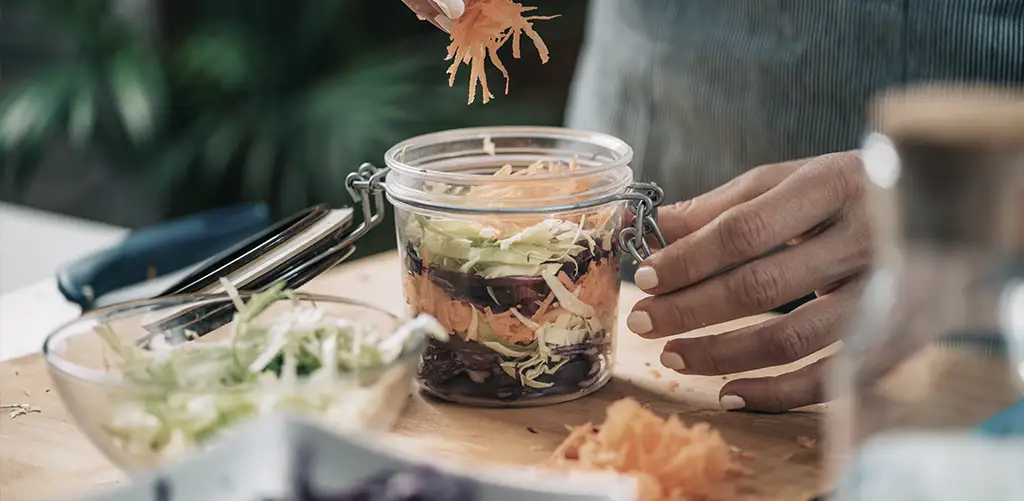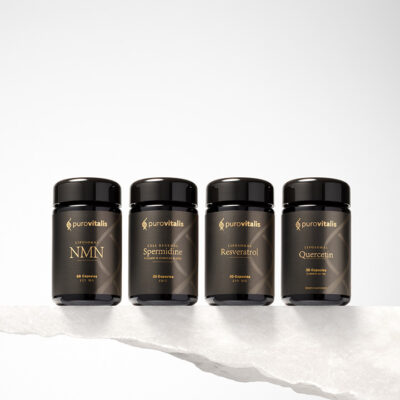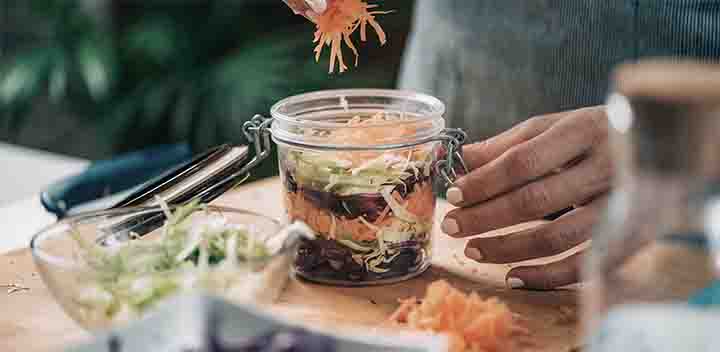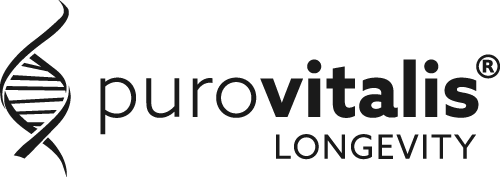
table of contents
- Why is gut health important for longevity?
- How aging affects your digestion
- Leaky gut: What is it and what can you do about it?
- How to reset your gut naturally
- Add probiotic foods in your diet
- Probiotic food to prevent bloating
- Feed your gut’s good bacteria with prebiotic foods
- A healthy lifestyle creates a healthy gut
- Expert tips on gut-friendly meals: Dr. Gundry’s recommendations
- Foods you want to avoid
As you age, your body goes through many changes, and one of the most significant transformations happens in your gut. The gut microbiome — a complex and dynamic ecosystem of microorganisms—plays an important role in your overall health. Aging can impact the diversity and functionality of these gut microbes, leading to various health issues. Understanding the relationship between aging and gut health is essential for promoting longevity and maintaining a high quality of life in your later years.
In this article, we’ll cover simple ways to support your digestion as you get older, including easy food swaps, pro- and prebiotics, and even a few foods you might want to skip. It’s all about staying healthy, feeling good, and making choices that help you enjoy life as the years go by.
Why is gut health important for longevity?
A healthy gut contributes to a strong immune system, efficient digestion, and even your mental health and wellbeing. Research shows that people with a diverse and balanced gut microbiome tend to have a lower risk of chronic diseases and age-related health issues. This highlights why maintaining gut health is an effective strategy for promoting longevity.
Learn all about longevity here: Understanding Longevity: more than just living longer
How aging affects your digestion
As you get older, your digestive system’s efficiency can decline, leading to a slower metabolism and changes in your gut flora. This decline is part of a larger shift in your body’s functions, which can make you more vulnerable to certain diseases. Adjusting your diet to support these age-related changes is important. Choose foods that are both nutrient-rich and support the health and diversity of your gut microbiome. It’s also essential to take a holistic approach to aging. This means not only focus on your diet, but also factors such as physical activity, sleep and stress management.
Leaky gut: What is it and what can you do about it?
Leaky gut, or increased intestinal permeability, occurs when the tight connections between cells in the intestinal wall become more permeable. This allows larger molecules, like bacteria, toxins, and undigested food particles, to pass from the intestines into the bloodstream, potentially triggering an immune response. This condition is linked to chronic inflammatory diseases and autoimmune disorders. Elevated levels of the protein zonulin, along with factors like stress, poor diet, and infections, are believed to increase the risk of leaky gut.
How to improve your gut health naturally
Keeping a balanced diet is important for gut health, especially as you age. Opt for easily digestible foods and include plenty of fiber, probiotics, and prebiotics to enhance gut function. A variety of fruits, vegetables, whole grains, and fermented foods will help maintain a balanced gut microbiome.
For example, eating a range of plant-based foods provides essential nutrients and promotes microbial diversity, which benefits gut health. Additionally, fermented foods like yoghurt, kefir, sauerkraut, and kimchi are rich in probiotics that can improve digestion and support a healthy gut microbiome.
How to reset your gut naturally
A gentle, week-long gut reset can help restore balance and improve digestion. Try these simple steps:
- Increase fiber: Add whole grains, vegetables, and fruits to feed beneficial gut bacteria.
- Incorporate probiotic foods: Include yogurt, kefir, or sauerkraut to balance the microbiome.
- Try intermittent fasting: Give your digestive system a rest by fasting for a portion of the day.
- Stay hydrated: Drink plenty of water to support digestion and nutrient absorption.
- Prioritize sleep: Aim for restful sleep to help the gut recover and function optimally.
Add probiotic foods in your diet
Foods rich in probiotics contain live microorganisms similar to the beneficial bacteria in your digestive system. Including these probiotic-rich foods in your diet can increase your levels of “good” bacteria. Common probiotic bacteria include Lactobacillus and Bifidobacterium, introduced into foods through fermentation. Here are some popular and easy to add probiotic foods:
| Probiotic food | Description | Notes on use |
| Yoghurt | Fermented milk product, rich in beneficial bacteria | Common as a snack or as breakfast |
| Kefir | Similar to yogurt but thinner and with more probiotic strains | Great in smoothies |
| Sauerkraut | Finely shredded cabbage fermented by lactic acid bacteria. | Often a side dish for dinner |
| Kimchi | Spicy fermented vegetables, usually made with cabbage and radishes | Pairs well with rice |
| Miso | Japanese seasoning made from fermented soybeans | Ideal for soups |
| Tempeh | Fermented soybeans with a firm, cake-like texture | High-protein food |
| Pickles | Cucumbers fermented in a saltwater brine; only naturally fermented pickles contain probiotics | Salty snack |
| Kombucha | A fizzy, fermented tea drink, often flavored with fruits or herbs | Refreshing drink |
| Fermented Cheese | Gouda, mozzarella, and cheddar (if made from unpasteurized milk) | Varies by type |
Probiotic food to prevent bloating
Certain probiotic strains, like Lactobacillus acidophilus NCFM and Bifidobacterium lactis Bi-07, can help improve digestion and reduce bloating by balancing gut bacteria. A clinical study published in the Journal of Clinical Gastroenterology involved 60 participants (72% female, average age 37). The study showed that participants who took these two strains twice daily over 8 weeks experienced a significant reduction in bloating compared to the placebo group, with the most noticeable effects occurring between weeks 4 and 8. These results suggest that regular use may be effective for those with functional bowel disorders (FBDs). When choosing a probiotic, look for products with these specific strains, known for their positive impact on digestion like the natural sources listed above. Check out this post on probiotics and prebiotics to learn more!
Feed your gut’s good bacteria with prebiotic foods
Just consuming probiotics isn’t enough for maintaining gut health; it’s also essential to eat foods that nourish these beneficial microbes. Prebiotics are specific types of soluble fiber that serve as food for healthy gut bacteria. Including prebiotic-rich foods in your diet helps maintain a well-balanced gut microbiome. Great sources of prebiotics include:
| Prebiotic food | Key prebiotic component | Health benefits |
| Garlic | Natural prebiotics | Supports immune system and gut bacteria |
| Onions | Inulin, FOS | Promotes gut health and nutrient absorption |
| Leeks | Inulin | Supports digestive health |
| Asparagus | Prebiotic fibers | Creates a healthy gut environment |
| Bananas (green) | Resistant starch | Helps promote beneficial gut bacteria |
| Apples | Pectin | Supports butyrate production and gut integrity |
| Jerusalem Artichokes | Inulin | Enhances good bacteria growth |
| Chicory | Inulin | Often used in coffee substitutes for gut health |
| Oats | Beta-glucan | Supports digestion and heart health |
| Flaxseeds | Soluble fiber | Improves gut motility and bacterial diversity |
A healthy lifestyle creates a healthy gut
Improving gut health is an ongoing journey that includes more than diet. A holistic approch in your lifestyleplay an essential role:
- Physical activity – Regular exercise helps maintain overall health and positively influences gut health, improving mobility and microbial diversity.
- Sleep – Getting enough sleep is vital. Poor sleep can harm gut health and vice versa. Quality sleep supports gut functions and regulates circadian rhythms, contributing to a healthy microbiome.
- Stress management – High stress can disrupt gut bacteria, leading to gastrointestinal issues. Practices like mindfulness, meditation, and hobbies can positively impact gut health.
- Hydration – Drinking adequate water is crucial for digestion, nutrient absorption, and maintaining the intestinal lining’s health. Proper hydration also prevents constipation, supporting smooth gut movement.
Gut health and nutrient absorption
Absorption is the process by which our bodies take in nutrients from the food we eat. It primarily occurs in the small intestine, where nutrients like vitamins, minerals, carbohydrates, proteins, and fats are absorbed into the bloodstream. This process makes sure that our cells receive the necessary components to function correctly. Without proper absorption, our bodies would not be able to get the essential nutrients needed for growth, repair, and maintenance.
By absorbing nutrients proficiently, our bodies can produce and manage energy, powering not just physical activity, but also cognitive processes.
Factors affecting absorption
Gut health
A healthy gut, lined with a balanced microbiome, is fundamental in maximizing absorption. Furthermore, compromised gut health due to inflammation can significantly delay this process.
Nutrient balance
Some nutrients have the ability to improve or slow down the absorption of others. For example, vitamin C can be a powerful ally in supporting the absorption of iron. Therefore, the importance of maintaining a well-balanced diet cannot be overstated.
Lifestyle choices
Lifestyle factors such as alcohol consumption, smoking, and stress levels can negatively impact the absorption capabilities of the gut. Conversely, routine exercise and mindful eating habits can enhance digestive efficiency.
Medical conditions
Medical conditions like Crohn’s disease, celiac disease, and others can interfere with absorption and lead to deficiencies and long-term health complications. Addressing these conditions holistically is crucial for absorption restoration.
Ways to improve nutrient absorption
Eat more slowly: chewing food thoroughly and savouring each bite helps enzymes in your saliva begin the digestive process, making it easier for your stomach and intestines to absorb nutrients and reduce the risk of indigestion or discomfort.
Add enough fats to your meals: this will help improve the absorption of fat-soluble vitamins like A, D, E, and K. This can be achieved by adding cold-pressed virgin olive oil to your veggies or enjoying them with foods like avocados, nuts, eggs, or fish.
Include probiotics and prebiotics: probiotics and fermented foods are known for promoting gut health and supporting nutrient absorption.
Stay hydrated: drinking water with meals supports the food movement and nutrient absorption. It also softens stools, preventing constipation, and reduces the risk of colon cancer.
Pick supplements with liposomal delivery – it’s a powerful method to improve nutrient absorption. At Purovitalis, we use liposomal technology in all our products. This technology makes sure that the active ingredients in our supplements are protected and delivered effectively to where they’re needed in your body.
Expert tips on gut-friendly meals: Dr. Gundry’s recommendations
Dr. Steven Gundry, a renowned physician and author, focuses on gut health and lectin-free diets. His recommendations suggest reducing lectins in the diet, which may benefit those sensitive to these natural plant proteins. He advises choosing low-lectin foods like leafy greens and cruciferous vegetables while limiting certain beans and grains. This approach may help support healthy digestion and reduce gut irritation.You can read more about Dr. Gundry’s plan here.
Foods you want to avoid
After focusing on foods that support a healthy gut, it’s also important to know which foods might be best to avoid. Certain foods can disrupt digestion, potentially causing inflammation and promoting the growth of harmful bacteria. Here are some key types to limit:
| Foods to Avoid | Reason for Avoiding |
| Processed Foods | High in additives, low in fiber, disrupts gut |
| Refined Sugars & Sweeteners | Promotes harmful bacteria |
| Red & Processed Meats | Can increase inflammation |
| Fried Foods | Hard to digest, promotes bad bacteria |
| Excessive Alcohol | Irritates gut lining and microbiome |
| Dairy (if lactose-intolerant) | Causes bloating, gas in sensitive individuals |
| Gluten (if sensitive) | Can cause inflammation in gluten-sensitive people |
| High-Fructose Corn Syrup | Linked to inflammation and metabolic issues |
| Artificial Trans Fats | Negative impact on inflammation and gut health |
Is coffee bad for gut health?
Coffee’s impact on gut health is complex—it stimulates digestion for some, while for others, it can cause issues like acid reflux, bloating, or discomfort. These mixed effects come from coffee’s acidity and caffeine, which may irritate the gut lining in sensitive individuals. It’s important to be mindful of amounts and find a balance that works for you.
Related: Coffee and Intermittend Fasting
Is stevia bad for gut health?
Stevia, a calorie-free sugar substitute, is generally considered safe, but some studies indicate it may impact gut bacteria. A 2020 study in Molecules found that compounds in stevia could inhibit certain beneficial microbes in the gut, though more research is needed to confirm long-term effects. For gut health, moderate consumption is likely safe, especially when paired with a balanced diet.
Quercetin: A natural boost for gut health
Quercetin, is known for its beneficial effects on gut health. Its anti-inflammatory and antioxidant properties are particularly useful for maintaining the gut barrier’s integrity, helping to prevent conditions like leaky gut syndrome. Quercetin can be a valuable addition to a diet focused on gut health.
Find everything you need to know about Quercetin: benefits, dosage, and side effects explained
Conclusion
Aging isn’t just about getting older; it’s also about how our body changes over time, especially in the gut. Factors like a balanced diet, regular exercise, and effective stress management are essential for a healthy aging process. By adopting these habits, you can counteract the effects of aging on both physical and mental functions, leading to a healthier, more fulfilling life in your later years. Taking these steps adds not just years to your life, but life to your years.
Related: The Complete Guide to Nutrition for Longevity – Foods, Diets, and more
References
- Nagpal R, Mainali R, Ahmadi S, et al. Gut microbiome and aging: Physiological and mechanistic insights. Nutr Healthy Aging. 2018;4(4):267-285. doi:10.3233/NHA-170030.
- Ringel-Kulka, T., Palsson, O. S., Maier, D., Tkalcić, M., Barrett, T., Guerrant, R. L., & Ringel, Y. (2011). Probiotic Bacteria Lactobacillus acidophilus NCFM and Bifidobacterium lactis Bi-07 versus Placebo for the Symptoms of Bloating in Patients with Functional Bowel Disorders. Journal of Clinical Gastroenterology, 45(7), 518-525. https://doi.org/10.1097/MCG.0b013e31820ca4d6
- Ruiz-Ojeda, F. J., Plaza-Díaz, J., Sáez-Lara, M. J., & Gil, A. (2019). Effects of Sweeteners on the Gut Microbiota: A Review of Experimental Studies and Clinical Trials. Frontiers in Nutrition, 6, 46. https://doi.org/10.3389/fnut.2019.00046

Track 50+ health metrics with AI-powered accuracy. Start your free trial today and take control of your wellness journey!

premium supplements Liposomal Technology made in EU Third party lab tested
Experience life to its fullest because you deserve the best! Try Purovitalis supplements!


 Skip to content
Skip to content










